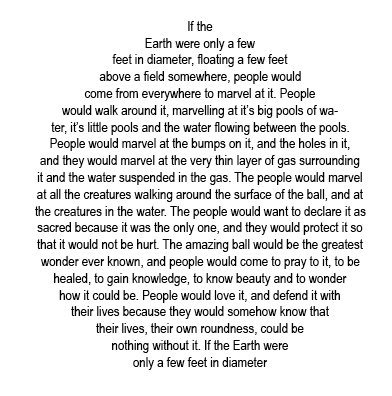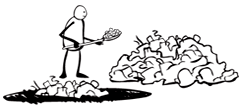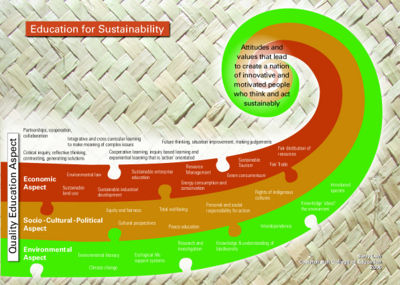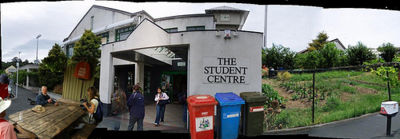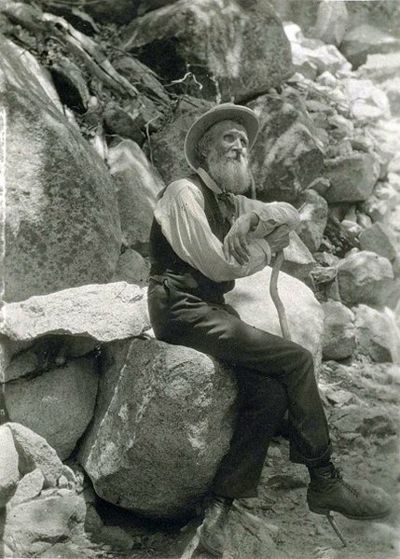Sustainable practice 1
Welcome to Sustainable practice 1. This course is currently being developed to be delivered face to face. The benefits of face to face such as communication through body language and the physical presence of emotion enhances the learning in an emotive course such as this.
Before continuing onto engage in this course please fill out this pre-course questionnaire. Copy the questions onto your blog and answer each in turn.
Contents
- 1 Introduction to Sustainability
- 2 The Issues
- 3 Systems Thinking
- 4 Maori and sustainability
- 5 Student driven learning and Taking Action
- 6 Travel and Tourism students work
- 7 Where to from here
- 8 Further Tutorials
- 9 Collated list of Resources
- 10 Quotes
- 11 This course is used in the following programme
- 12 Related courses
Introduction to Sustainability
“Every human has a fundamental right to an environment of quality that permits a life of dignity and well-being” United Nations Conference on the Human Environment, Stockholm
Toitü he whenua, whatungarongaro he tangata. Translation: Land is permanent, man disappears.
So what is it we're trying to sustain? The land? The economy? Our species?
To do
- 1. Intro’s – Map of NZ activity. In this activity we will come together and explore our boundaries, what it means to be a New Zealander in the context of a sustainable life, and get to know one another.
- 2. What is sustainability? In this step we will find out what each other thinks sustainability is and see if we can discover some new ideas among us.
- In 3 groups brainstorm ideas on what sustainability is. In a brainstorm everything is written down, everyone’s ideas are valid, nothing is right or wrong, it’s simply a brainstorm used to explore and generate ideas.
- Create your own definition of sustainability - do this in your 3 groups, then come together as a full class to agree on your definition. This will then be added to the following slide show that also contains some well known, often quoted definitions.
- Slide show of a number of well known definitions of sustainability
- 3. Explore personal values around sustainability. Here you will consider what you personally think deep down about sustainability. This activity is for you and is private and personal.
- Explore your personal values and how they relate to sustainability. 10 min
- Where do you stand? Find out during this interactive activity that will test your values and help you consider the way in which you view the world. 10 min
- Fish game Lets go fishing! See the Red Fish Guide for a guide to sustainable fish stocks.
- 4. Look at Otago Polytechnic's policies on Education for Sustainability and find out how they are planning its action?
- Slide show of the journey the Polytech is on. This can also be viewed with audio commentary in three parts here Part 1, Part 2, Part 3.
- 5. With a partner brainstorm what worries you about this topic and what interests you about this topic. This can be an emotive subject. Reflect on any emotions you've experienced through the first session of this course. Share as much as you want to with the rest of the class
In your own time
- 6. Set up a blog.
- 7. Discuss the concept of Reflective Practice for use throughout the course, in life and in order to complete tutorials. See this resource for some of the theory of Reflective practice. Discuss the Hegarty Reflective Framework and Template and how it can be used in our situation. View framework for smaller reflection
- 8. Send the link to your blog to the course facilitator. See the list of course participant blogs
- 9. Read the following report: Millennium Ecosystem Assessment. Comment on this reading on your blog.
- 10. Watch An Inconvenient Truth in class or get it out in your own time. Critically evaluate this movie on your blog and respond to someone else’s blog. See The Inconvenient Truth offical website. You can rent the movie from your local video shop.
- 11. Read 'What is Sustainability anyway?'– What is Sustainability anyway?
- 12. Watch the End of Suburbia dvd in class or in your own time and record your thoughts and opinions of the movie on your blog. Comment on someone elses blog. View The End of Suburbia for free online or you can rent it from you local video shop.
- 13. Food, Inc. DVD. You'll never look at dinner the same way! ["http://www.takepart.com/sites/default/modules/takepart/takepart_video/swf/player.swf" View trailer]. See http://www.foodincmovie.com/ for the offical movie site. Rent it from your local video shop.
- 14. earth2100 documentary can be viewed on Youtube in 9 parts. See http://www.youtube.com/watch?v=LHNSLxDmMCM
- 15. This is an interesting video to stimulate discussion in class. Life in Biosphere 2
Links and resources
Good explanation of Education for Sustainability - http://seniorsecondary.tki.org.nz/Social-sciences/Education-for-sustainability
http://www.sciam.com/article.cfm?id=top-10-myths-about-sustainability
http://en.wordpress.com/tag/visualisingsustainability/
http://www.slideshare.net/Annah/definitions-1391863
http://www.slideshare.net/Annah/otago-polytechnics-journey-of-sustainability
The Issues

"Only when the last tree has died and the last river been poisoned and the last fish been caught will we realise we cannot eat money."
The advent of a currency has seen a move away from producing life sustaining goods in order to survive. Indigenous cultures have suffered the most in this system change as they have always relied on living on and with the land.
Facilitator's interpretation.
To do
- 1. A few commonly used models to explain sustainability
- 2. What are the issues? See Links and Resources below for direct links to slide shows and more information on some of the issues.
- 3. View the slide show on New Zealand's sustainability issues
- 4. Play Zoom or Possum Picnic
- 5. View the slide show on the positive responses to the issues of sustainability
In your own time
- 1. Read the following 2 quotes and make your own comment about them on your blog.
Every day we are exposed to a barrage of information, advertisements, and stories in newspapers, on billboards and on television… information that tells us what is important in the world… advertisements that tell us about our priorities in life… and billboards that encourage us to want more. It may seem all too easy to just accept what we read and what we are told… But stop and think about what is really being said?… What are we really being sold?… What are the real messages?… Who is telling them and why are they telling them?… Who benefits from these messages?
Next, reflect on your own thoughts and perceptions… What assumptions are you making about the messages you read and hear?… How do your personal values influence these perceptions?… How has your family life, culture, gender or faith shaped the way you interpret these messages… the world?"
- Tilbury, D. and Wortman, D. (2004) Engaging People in Sustainability
There are always competing interests in debates about sustainability and it is important to build tolerance around different interests and perspectives. However, it is also important to keep questioning and scrutinising what it is that people and institutions are actually seeking to sustain.
- New Zealand Parliamentary Commissioner for the Environment (2000) See Change: learning and education for sustainability p.44
- 2. View and listen to a talk from Yann Arthus Bertrand Yann directed the movie 'Home', 'The Earth from Above' and '6 Billion others'. This is a wee intro to his movie 'Home.' Check out the full feature! People have been quite inspired by this. It can be quite depressing, but seeing it through to the end will make it worth while.
HIGHLY Recommended - 'Home' by Yann Arthus Bertrand.
- 3. Drink out of plastic bottles? Watch this 5 minute Youtube clip and read the info on this site, http://articles.mercola.com/sites/articles/archive/2010/05/06/a-movie-about-water-you-need-to-see.aspx
- 4. View the animation called The Story of Stuff NB. You may need to open this up before you want to view it and buffer the next section in a new tab while watching the previous one. This saves some time and frustration if your computer is slow.
Discuss this on your blog. What really hit home for you? What do you question about the movie? What would you like to explore further?
- 5.
Links and resources
- http://www.slideshare.net/Annah/sustainability-the-issues
- http://www.slideshare.net/Annah/new-zealand-and-sustainability
- http://www.slideshare.net/Annah/positive-responses-to-sustainability-issues
- http://www.traumkrieger.de/virtualwater/
- http://www.waterfootprint.org/?page=files/home
- http://www.storyofstuff.com
More resources on the Issues
- NZ initiative. Sport and sustainability with NZ ambassadors. http://www.projectlitefoot.org/home/
- Article on Global Food Security, Africa. Call to action on food security
- Interesting climate change Youtube clip Makes a good case for why we should act on the climate change issue.
- Very good video on E-Waste. Travel from Ghana to India. Irresponsible recycling in the West creating digital dumping grounds in developing nations. What is the true cost of your TV and computer?? http://www.pbs.org/frontlineworld/stories/ghana804/video/video_index.html Also see the links on the left of the video. Interactive map of the world showing global trade in electronic waste.
- Peru: battle for the amazon. Covers: Environmental – oil companies pollution, destruction of environment with impact on local residents, exploitation of locals, government involvement. http://www.youtube.com/watch?v=2vvxxRrc6Jg – part 1
http://www.youtube.com/watch?v=jLuJtsmTjn0&feature=channel – part 2
- Issues about our Ocean Environment - http://www.ted.com/talks/brian_skerry_reveals_ocean_s_glory_and_horror.html
Systems Thinking
“Until man duplicates a blade of grass, nature can laugh at his so-called scientific knowledge." - Thomas Edison
Plants are still the only net producers of carbohydrate. Without them we can not exist.
"When one tugs at a single thing in nature, he finds it attached to the rest of the world." - John Muir
The interconnectedness of life on earth makes systems thinking and sustainability a very complex, but very important task.
"Problems in the world can not be fixed with the same thinking that created them." Albert Einstein
To do
- 1. Understand the Laws of Thermodynamics and Photosynthesis
- The first law of thermodynamics says that the total quantity of energy in the universe remains constant. This is the principle of the conservation of energy.
- The second law of thermodynamics states that the quality of this energy is degraded irreversibly. This is the principle of the degradation of energy.
- Photosynthesis is the process by which plants, some bacteria, and some protistans use the energy from sunlight to produce sugar, which cellular respiration converts into ATP, the "fuel" used by all living things. The conversion of unusable sunlight energy into usable chemical energy, is associated with the actions of the green pigment chlorophyll. Most of the time, the photosynthetic process uses water and releases the oxygen that we absolutely must have to stay alive. Oh yes, we need the food as well!
Discuss these concepts and come up with practical real life examples of the above processes.
- 2. Look at the science and systems behind sustainability. Play the carbohydrate game or the Fish game in teams. See Fish game for online version of the Fish game.
- 3. Slide show: Explaining the 4 system conditions How the system conditions can be used to take a systems approach to addressing sustainability.
- 4. Look at the models in relation to education for sustainability (EfS).
In your blog indentify the goals of EfS and explain what processes are suggested for effectiveness in teaching/learning around sustainability?
- 5. Look at the Course outline. In your blog comment on the different approaches to sustainability learning/teaching that are outlined in the Action Competence Models. How are these models being applied in this course?
Links and resources
- EfS_Swirl
- Action Competence Models
- Integrated Approach
- Experiential Learning
- http://www.slideshare.net/Annah/system-conditions-and-thinking
- http://www.emc.maricopa.edu/faculty/farabee/BIOBK/BioBookEner1.html
- Another site explaining the Laws of Thermodynamics: http://pespmc1.vub.ac.be/ENTRTHER.html
- Another site explaining Photosynthesis and carbon http://bioenergy.asu.edu/photosyn/education/photointro.html
- Centre for Ecoliteracy. Co-founder and chair of the board - Frijof Capra. A physicist best known for his work in systems thinking. http://www.ecoliteracy.org/essays/ecology-and-community
Maori and sustainability
View the slide show Maori and Sustainability for a brief look at some aspects of sustainability in relation to the Maori culture.
Links and resources
Sustainability and a Maori world view. Grant Hawke. http://www.landcareresearch.co.nz/sustainability/sustainabilty_details.asp?Sustainability_ID=101
Student driven learning and Taking Action
"Never doubt that a small group of thoughtful, committed citizens can change the world; indeed, it is the only thing that ever has." - Margaret Mead (1901-1978) quoted in John M. Richardson, ed. Making it Happen, 1982
- Consider the above quote in relationship to Action Competence and the model for an Integrated Approach to addressing issues.
"Be the change you want to see in the world." -Mohandas Gandhi
- What skills do people need in order to live by this quote?
"Although attempting to bring about world peace through the internal transformation of individuals is difficult, it is the only way" - Dalai Lama
To do
- 1. Read the Ecological Footprint slideshow and follow the links on the last page to complete your own ecological footprint. Look at all the ways you practice sustainability in your life. List them on your blog. Read someone else’s blog and comment on the ways they practice sustainability – be honest, positive and constructive – mere praise is not constructive! Ask questions about how they practice, what they find easy or difficult about it, what's the next step they can take?
- 3. Read Tilbury, D. and Wortman, D. (2004) Engaging People in Sustainability,Commission on Education and Communication, IUCN, Gland, Switzerland and Cambridge, UK. Link:Engaging People in Sustainability Comment on this reading on your blog.
- 4. Look at the Course outline and as a group discuss the following questions: or (write to your blog responses to the following):
- What needs to be covered in the course?
- Content ideas:
- What do you need to learn in order to meet the learning outcomes?
- Brainstorm some of the ways these needs might be met
- Content ideas:
- Assessment Ideas:
- Action journal
- Project
- Workshop
- Producing something
- Becoming a global citizen (your journey to living more sustainably)
- Assessment Ideas:
Decisions need to be made about the process, content and assess of this course. These decisions need to be made by the end of the next class. The content can have some flexibility, but the assessment must be set. This is your opportunity to drive your own learning in this area. It is not very often you get the opportunity to decide what you want to learn (within a context and some limits), how you are going to learn and then how that learning will be assessed. Make the most of this opportunity!
- 5. The following quote talks about moving people from a state of 'awareness' to a state of 'action':
- “People are not unaware of the social and environmental problems they face, and more often than not, they have learned quite a lot about them from the media, scientists, governments and daily experience. Consequently, there is a need to move beyond awareness to engage people critically and creatively in their own communities, planning and engaging for action.” - UNESCO (2002) Education for Sustainability, from Rio to Johannesburg: Lessons learnt from a decade of commitment’ p. 38 25
- Consider what input you have in this course. How will you move to a state (or more committed state) of action? Brainstorm ideas in small groups and report back to the whole group.
- 6. Create a class contract
This contract will form the basis for regular self and peer feedback sessions related to your work as a group. These session times will be negotiated with your tutor and facilitated by your tutor. The purpose of the sessions is to keep everyone on track with your aims and goals and to provide you with the opportunity to reflect on your input in the running of the course.
- 7. Set a timeline for the development of the course (may have some flexibility) and indicate milestone objectives. List resources and methods relevant to each milestone. Set regular meeting dates and take meeting notes and assign jobs.
Create a collaborative timetable like this one that can be linked to this wiki. Include all the timetabling and resource information you need.
Links and resources
More resources for Taking Action
- Ministry for the Environment The Govt3 Programme on sustainable procurement and energy effeciency. See the Simply Sustainable: Tools and Resources tab on the left hand side of this page.
- "Within Reach" is a CC BY-SA licensed film project that documents sustainable communities across the US: http://www.withinreachmovie.com/
Travel and Tourism students work
This is the introduction to sustainable practice assessment the students have created so far. Still to come is Task 3 from the tutor and the marking schedule.
See discussion for ongoing progress on the project the students have choose to carry out. Any resources they develop will be available here.
Here is the marking schedule for assessment each task worth 25% and self and peer feedback worth 50% of the assessment. A copy of the self and peer feedback assessment will be emailed to you. You must fill it out for yourself and every other member of your class. Email all of them to annah at tekotago dot ac dot nz. Although I will know what you wrote for yourself and each person, they will be sent onto the applicable person anonymously. All parts of the assessment are due on Tues 23rd of July. Please submit to Hillary.
Where to from here
Meet to confirm the course content and assessment as accurately as possible.
Finish filling out the table.
Tutor input:
- There must be a self/peer feedback component to the assessment task and it must be formative assessment, e.g. ongoing throughout the course. Blog posts will contribute to this.
- Be in agreement with group decisions - as all group members need to be
- Be a part of the contract
- Assess the task for each student with a strong consideration of the self/peer feedback
- Be a resource to the course
- Do a share of the 'jobs' needed for successful completion of the course
- Facilitate feedback sessions - at least one during the course
- Notes from all sessions must be recorded and posted on this wiki
Further Tutorials
Directed learning where needed
Collated list of Resources
Drink out of plastic bottles? Watch this 5 minute Youtube clip and read the info on this site, http://articles.mercola.com/sites/articles/archive/2010/05/06/a-movie-about-water-you-need-to-see.aspx
NZ initiative. Sport and sustainability with NZ ambassadors. http://www.projectlitefoot.org/home/
Puma, sporting equipment: http://www.triplepundit.com/2010/05/puma-propagates-sustainability-down-the-supply-chain/
Torino commitments on Sport and Environment: http://www.docstoc.com/docs/40525069/TORINO-COMMITMENTS-ON-SPORT-AND-ENVIRONMENT
Centre for Ecoliteracy. Co-founder and chair of the board - Frijof Capra. A physicist best known for his work in systems thinking. http://www.ecoliteracy.org/essays/ecology-and-community
Sustainability and a Maori world view. Grant Hawke. http://www.landcareresearch.co.nz/sustainability/sustainabilty_details.asp?Sustainability_ID=101
Good explanation of Education for Sustainability - http://seniorsecondary.tki.org.nz/Social-sciences/Education-for-sustainability
Food, Inc. DVD. You'll never look at dinner the same way! ["http://www.takepart.com/sites/default/modules/takepart/takepart_video/swf/player.swf" View trailer] See http://www.foodincmovie.com/ for the offical movie site
earth2100 documentary can be viewed on Youtube in 9 parts. See http://www.youtube.com/watch?v=LHNSLxDmMCM
This is an interesting video to stimulate discussion in class Life in Biosphere 2
Call to action on food security
25 Steps towards Sustainability
Ministry for the Environment The Govt3 Programme on sustainable procurement and energy effeciency. See the Simply Sustainable: Tools and Resources tab on the left hand side of this page.
Charles Moore: Sailing the Great Pacific Garbage Patch
More on the Great Pacific Garbage Patch
Interesting climate change Youtube clip Makes a good case for why we should act on the climate change issue.
Talk from Yann Arthus Bertrand Yann directed the movie 'Home', 'The Earth from Above' and '6 Billion others'. This is a wee intro to his movie 'Home'
HIGHLY Recommended - 'Home' by Yann Arthus Bertrand. This application can be downloaded at http://www.vuze.com
The link for “Home” is http://www.vuze.com/details/DKA6O7LZNITYGVW2V6LTHRYIHWSB2IOC/HOME+2009.html (NB. Institutional computers may not allow you to use this site).
Dunedin Enviro Schools response to the National Governments funding cuts to Education for Sustainability June 2009 http://www.youtube.com/watch?v=6sD-_d3rIdc
An article on marketing to children http://www.medialens.org/alerts/09/090629_turning_children_into.php
Very good video on E-Waste. Travel from Ghana to India. Irresponsible recycling in the West creating digital dumping grounds in developing nations. What is the true cost of your TV and computer??
http://www.pbs.org/frontlineworld/stories/ghana804/video/video_index.html Also see the links on the left of the video. Interactive map of the world showing global trade in electronic waste.
Peru: battle for the amazon. Covers: oil companies, pollution, destruction of environment with impact on local residents, exploitation of locals, government involvement.
http://www.youtube.com/watch?v=2vvxxRrc6Jg – part 1
http://www.youtube.com/watch?v=jLuJtsmTjn0&feature=channel – part 2
"Within Reach" is a CC BY-SA licensed film project that documents sustainable communities across the US: http://www.withinreachmovie.com/
Quotes
"I am only one, but I am one. I cannot do everything, but I can do something. And, I will not let what I cannot do interfere with what I can do." Edward Hale
"If you aren't a part of the solution, then you are a part of the problem." anon
"There is no 'away' to throw to." anon
"Pollution results not from our numbers but from our lifestyles and our rate of consumption." Lester W. Milbrath
"There is only one corner of the universe you can be certain of improving and that is your own self." Aldous Huxley
"The birth of a baby in the United States imposes more than a hundred times the stress on the world's resources and environment as a birth in, say, Bangladesh. Babies from Bangladesh do not grow up to own automobiles and air conditioners or to eat grain-fed beef. Their lifestyles do not require huge quantities of minerals and energy, nor do their activities seriously undermine the life-support capability of the entire planet." National Geographic Magazine, December, 1989.
"Problems in the world can not be fixed with the same thinking that created them." Albert Einstein
"You learn that if you sit down in the woods and wait, something happens." Henry David Thoreau
"Man did not weave the web of life,
He is merely a strand in it.
Whatever he does to the web,
He does to himself."
Chief Seattle
"The reasonable man adapt himself to the world; the unreasonable one persists to adapt the world to himself. Therefore, all progress depends on the unreasonable man." George Bernard Shaw
